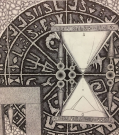Hus the Heretic

"Jan Hus (/hʊs/; Czech: [ˈjan ˈɦus]; c. 1370 – 6 July 1415), sometimes anglicized as John Hus or John Huss, and referred to in historical texts as Iohannes Hus or Johannes Huss, was a Czech theologian and philosopher who became a Church reformer and the inspiration of Hussitism, a key predecessor to Protestantism, and a seminal figure in the Bohemian Reformation. Hus is considered by some to be the first Church reformer, even though some designate the theorist John Wycliffe. His teachings had a strong influence, most immediately in the approval of a reformed Bohemian religious denomination and, over a century later, on Martin Luther. Hus was a master, dean and rector at the Charles University in Prague between 1409 and 1410." [1]
"John Hus was one of the greatest religious and spiritual pioneers to ever grace this earth, and many experts agree that the Reformation would have never been possible without him paving the way. He paid for his beliefs, however, by being burned at the stake in 1415 at the age of 42. This book is composed of three sections meant to provide the most complete picture of Hus that we can assemble. The main section is composed of two detailed letters from Poggius, a witness to the trial, to a friend. He appeared on the Church's behalf, but became secretly allied with Hus. Paul Tice adds a section providing additional background information on Hus, including his beliefs, motivations and friendships. Lastly we find a six page letter written by John Hus to his followers the night before his execution." [2]
- Wikipedia - overview of this book or author
- Archive.org - free, older, scanned, digital versions of this book or author
- eBay.com - printed, second-hand, early edition versions of this book or author
- Amazon.com - new, used, digital and print versions of this book or author
Note: The above quoted descriptions are not the words of Jason Breshears. They are collected from Wikipedia, Amazon, or wherever available. Please understand they may not represent truth.
